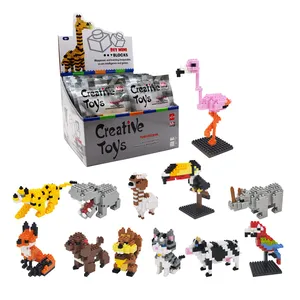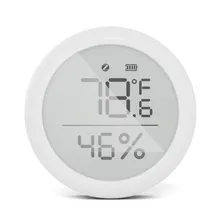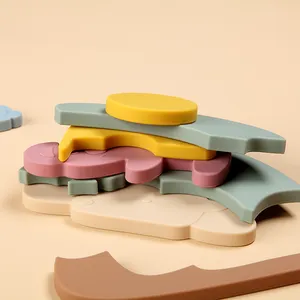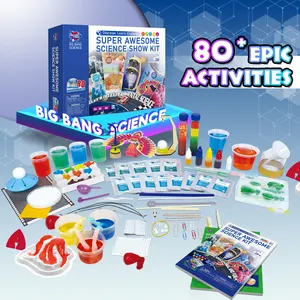What are Educational Kits
Educational kits are pre-packaged learning tools designed to facilitate hands-on experiences within various fields of study and interest. These kits are typically comprised of materials, components, and instructions necessary for the user to engage in activities that reinforce concepts in science, technology, engineering, arts, and mathematics (STEAM). They serve as a bridge between theoretical knowledge and practical application, making them an invaluable resource for educators, parents, and students.
Primarily targeted at young learners, educational kits cater to various age ranges, from toddlers to teenagers, ensuring that the complexity and content are age-appropriate. These kits allow children to explore, experiment, and create while developing critical thinking and problem-solving skills. For instance, a young child may engage with a simple robot kit that introduces basic mechanics and circuitry, while older students might delve into more complex projects like building a miniature renewable energy system.
The principle behind educational kits is learning by doing. Instead of passively absorbing information from a textbook or lecture, learners actively participate in the construction and manipulation of physical objects. This hands-on approach fosters deep understanding and retention of concepts because it involves multiple senses and often requires collaboration and communication with others. Educational kits also encourage experimentation, allowing learners to test hypotheses in real-world scenarios and see the immediate effects of their actions.
Types of Educational Kits
Educational kits come in a diverse array of types to cater to different interests and educational goals. Here's an overview of some common varieties:
DIY Toy Kits: These kits focus on creativity and craftsmanship, enabling children to build their own toys from materials provided. They often include elements of design and artistry while enhancing motor skills through activities like cutting, gluing, and assembling.
Model Toy Kits: Geared towards those interested in modeling, these kits contain parts for constructing detailed replicas of vehicles, buildings, or historical scenes. They are excellent for teaching patience, precision, and attention to detail.
Construction Toy Kits: Featuring a collection of interlocking pieces or blocks, construction kits challenge users to create structures or mechanisms. They're great for introducing principles of architecture, engineering, and spatial reasoning.
Electronic Toy Kits: Focused on introducing basic electronics and circuitry, these kits include components like resistors, LEDs, and batteries. They are instrumental in teaching the fundamentals of electricity and electronics.
Robot Chassis Kits: These kits provide the foundational parts for building robots. They're a fantastic resource for teaching robotics fundamentals, programming concepts, and mechanical design.
Science Experiment Kits: Designed to conduct scientific experiments at home or school, these kits come with chemicals or natural elements for safe experimentation. They help demonstrate scientific principles in a tangible way.
Each type of educational kit has its own specific use cases but generally serves the purpose of making learning interactive and enjoyable.
How to choose Educational Kits
Selecting the right educational kit requires understanding the needs and interests of the learners it's intended for. Considerations include age appropriateness, educational objectives, material safety, durability, and the specific subject matter being taught or explored.
Age Range: It's critical to choose a kit that matches the cognitive abilities and skill level associated with specific age groups—whether it's simple puzzles for toddlers or more sophisticated science kits for teens.
Material Quality: Ensuring that the materials are safe—free from toxic substances—and durable enough to withstand repeated use is essential when choosing a kit for young learners.
Educational Focus: Clearly identify the subject or skill set that you aim to develop with the educational kit. This could range from basic literacy and numeracy skills to advanced topics like robotics or chemistry.
Learning Outcomes: Consider what you want students to achieve by using the kit. Look for kits that align with your educational goals and can be easily integrated into your curriculum or learning environment.
Businesses should also consider the cost-effectiveness of bulk purchases as well as additional features such as eco-friendliness or inclusion of comprehensive instructional guides when selecting educational kits on Alibaba.com.
Best Educational Kits on Alibaba.com
Alibaba.com stands as an extensive marketplace where businesses seeking to enrich their educational offerings can find a wide variety of wholesale educational kits suited to different learning stages and interests. With an expansive selection that spans across DIY toys to sophisticated electronic modules suitable for older children interested in STEM subjects, Alibaba.com offers resources that can match any instructional need or creative endeavor.
The platform's commitment to facilitating global trade simplifies sourcing high-quality educational tools from reliable suppliers around the world. Alibaba.com ensures that procurement is streamlined even when dealing with complex requirements or large orders by offering services like Trade Assurance which safeguards transactions until delivery is complete. Moreover, businesses can communicate with suppliers in their local language through Alibaba.com's user-friendly interface enhancing clarity during negotiations.
By choosing Alibaba.com for sourcing educational kits businesses gain access not only to a vast array of products but also to a partner invested in supporting education through innovative solutions. Whether enhancing classroom learning or providing products that inspire young minds at home Alibaba.com is instrumental in bringing engaging educational experiences worldwide.
Common FAQs for Educational Kits
What age range should I consider when purchasing educational kits for my business?
When selecting educational kits, it's important to consider that products are tailored to specific age ranges, such as 0-24 months, 2-4 years, 5-7 years, and 8-13 years. Choose kits that align with the cognitive and skill levels of your target demographic.
How can I ensure the educational kits I purchase are safe for children?
Look for kits that specify the use of eco-friendly and non-toxic materials. Products often highlight safety features and may come with certifications indicating they have passed safety standards.
What types of educational kits are most popular for businesses to stock?
Popular types of educational kits include DIY toys, model toys, construction toys, electronic toys, and robot chassis kits. The popularity may vary based on trends and the educational focus of your clientele.
Are there educational kits suitable for group activities or classroom settings?
Yes, there are kits designed specifically for group activities and collaborative learning experiences. These can be used effectively in classroom settings to promote teamwork and interactive learning.
How do I choose an educational kit that aligns with my business's educational goals?
Identify the subject or skill set you aim to develop through the educational kit and choose products that offer relevant materials and instructions. Ensure the kit supports the learning outcomes you wish to achieve.
Can I find gender-specific educational kits?
While many educational kits are designed to be unisex, there are options available that may cater specifically to boys or girls. However, it is increasingly common for all kits to be inclusive and encourage learning across all genders.
What should I look for in terms of material quality in educational kits?
High-quality, durable materials like ABS plastic, wood, metal, or eco-friendly alternatives are common in well-made educational kits. These materials ensure longevity and repeated use.
Are there electronic educational kits that don't require prior knowledge of electronics?
Yes, there are beginner-level electronic kits that introduce basic concepts and include user-friendly instructions, making them accessible even without prior knowledge of electronics.
Can I find environmentally friendly educational kits?
Eco-friendly options are available among educational kits, often made with sustainable materials and designed to minimize environmental impact.
How do I select an educational kit with appropriate difficulty for advanced learners?
Look for kits labeled with recommend age ranges such as 7-12y or specifically designed for advanced concepts in areas like robotics, programming, or complex science experiments.
Is it possible to find educational kits that align with specific curriculums or standards?
Many suppliers offer kits that are designed to meet curriculum standards or supplement classroom learning objectives. It's best to review the kit descriptions or consult with suppliers about curriculum alignment.
What features should I look for when choosing construction toy kits?
Consider construction toy kits that promote creativity and problem-solving skills. Features might include interlocking pieces and versatility in the types of structures that can be built.
Do educational kits come with instructional guides or support materials?
Most educational kits come with instructional guides or manuals that provide step-by-step directions and additional support materials for educators or facilitators.
How can I ascertain the longevity and durability of an educational kit?
Check the product description for information on material composition and read reviews or inquire with suppliers regarding the expected lifespan of their products under normal use conditions.
Are there customizable options available for educational kits on Alibaba.com?
While Alibaba.com is a platform connecting suppliers with buyers rather than a direct seller, many suppliers offer customizable options for their products. It's advisable to communicate directly with suppliers regarding customization requests.











































 浙公网安备 33010002000092号
浙公网安备 33010002000092号 浙B2-20120091-4
浙B2-20120091-4